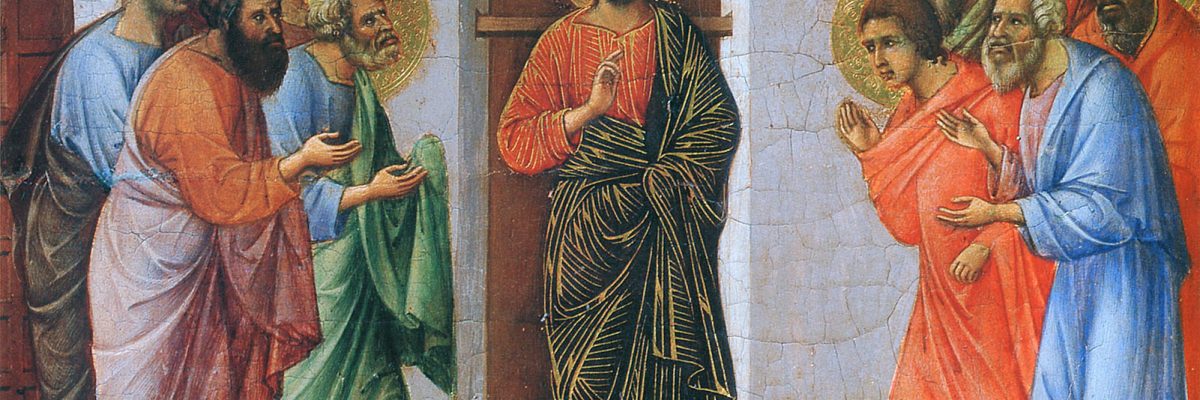
When it comes to providing biblical evidence for the sacrament of confession, no Bible passage is clearer than John 20:23: “If you forgive the sins of any, they are forgiven; if you retain the sins of any, they are retained.”
But for some Protestants, it’s not so clear. They see Jesus’ instruction merely as a command to preach the forgiveness of sins. Their reason is that this is what Luke records in his parallel account: “Then he opened their minds to understand the scriptures, and said to them, ‘Thus it is written… that repentance and forgiveness of sins should be preached in his name to all nations” (Luke 24:47; emphasis added).
According to this objection, Luke and John are describing the same event but express the instruction in different ways. It’s further argued that Luke’s version sheds light on the “forgive” and “retain” language in John’s Gospel: the apostles were to go out and preach the gospel, and if people responded, the apostles were to tell them that God had forgiven their sins. But if people didn’t respond, the apostles were to tell them that God had not forgiven their sins.
Does this objection have the force that some Protestants think it does? Let’s take a look.
Rapid-fire narrating
It’s true that Jesus’ instruction in Luke’s Gospel refers only to the preaching of the forgiveness of sins. But the objection assumes that the sequence of events in which this instruction is included (Luke 24:44-52) happened on Easter Sunday, and thus that it’s the same as the instruction in John 20:23.
A careful reading indicates otherwise.
Several times in the verses preceding the sequence of events in question (Luke 24:44-52), Luke uses time cues to indicate that what he’s recording took place on Easter Sunday: “On the first day of the week, at early dawn” (v.1), “that very day” (v.13), “that same hour” (v.33).
But when Luke begins the sequence of events that include the instruction to preach the forgiveness of sins, he doesn’t tie it into Easter Sunday. He drops the time cues and instead uses conjunctions in a rapid-fire manner starting in verse forty-four: “And then he said”[1] (v. 44; cf. 45, 50, 51, 52, 53).
The absence of time cues and the rapid-fire use of conjunctions suggest that Luke is summarizing a series of events that took place over a period of time after Easter Sunday. What period of time was that? It was the period of forty days that Jesus spent with his disciples prior to his ascension (Acts 1:3).
Notice that Luke connects Jesus’ instruction to preach the forgiveness of sins with Jesus’ instruction to preach his name “to all nations,” and that they were to begin in Jerusalem (v. 47). He also includes the Father’s promise to “send power from on high” (v. 49).
These are all items that Luke includes in his list of things that Jesus taught his disciples during the forty days before and on the day of his ascension (see Acts 1:1-10). Therefore, these instructions, including the instruction to preach the forgiveness of sins, likely were not given in the upper room on the night of Jesus’ resurrection.
One could even read these instructions as given on the day of the Ascension, since it has to do preaching to the nations (see Matt. 28:19-20), and Luke places them right before he records the Ascension.
Since the event involving Jesus’ instruction to forgive and retain (John 20:23) is likely not the same event as that of the instruction to preach the forgiveness of sins (Luke 24:47), the objection struggles to even get off the ground.
Don’t force it
A Protestant might respond, “Even if these things didn’t occur on the same day, maybe they mean the same thing.” But this is problematic for a few reasons.
First, nowhere in the immediate context of John 20 does Jesus talk about the apostles going out to preach the gospel.
Second, the wording itself doesn’t suggest an instruction to preach. The actions that Jesus’ ministers are to perform are forgiving and retaining: “If you forgive…if you retain.”
Telling someone to forgive is not the same thing as telling someone to preach. When I tell my four-year-old daughter to forgive her brother for pushing her, I don’t mean, “Tell him that he what he did was wrong and that he needs to repent in order for God to forgive him.”
To suggest that forgiving sins (and retaining sins) mean the same as preaching the forgiveness of sins is to force the text to be taken in an unnatural sense. And since there is no evidence in the context to suggest otherwise, we’re justified in taking the language in its natural sense.
Moreover, if Jesus meant what the objection suggests (tell people their sins will be forgiven or retained by God depending on whether they accept or reject the gospel), then why does Jesus say that the apostles are the ones that will be forgiving and retaining? (“If you forgive…if you retain.”) Of course, God is ultimately the one who forgives and retains sins. But the apostles are the ones that Jesus highlights as performing the action.
Do as I do
A third problem with the assertion that the two instructions mean the same thing is that it fails to take into account the connection Jesus makes between the mission his Father sent him on and the mission he’s sending the apostles on.
The Father didn’t send Jesus merely to preach the forgiveness of sins. He sent Jesus to actually forgive them. For example, Jesus didn’t tell the paralytic in Mark 2:5 about the forgiveness of sins; he told him, “Your sins are forgiven.”
Jesus makes it clear that he is sending his ministers on the same mission the Father sent him on: “As the Father has sent me, even so I send you” (John 20:21; emphasis added). And lest there be any ambiguity as to what that mission is, he tells them specifically that the mission involves forgiving and retaining sins.
Since Jesus’ mission didn’t involve merely the preaching of the forgiveness of sins but the actual forgiving of sins, and since Jesus is unequivocal about his apostles doing the same thing that his Father sent him to do, we can conclude that Jesus doesn’t intend that the apostles merely preach the forgiveness of sins but that they actually forgive them.
This makes sense of the command to forgive or retain. Like Jesus, the apostles are to judge whether to forgive or not to forgive. And since God doesn’t ordinarily give his ministers the gift to read souls, this further implies that the penitent would need to confess his sins and express contrition.
It’s interesting that Catholics are often accused of not being biblical enough when the Catholic understanding of this verse (and others) takes what the verse actually says more seriously, and thus is more biblical. The “preaching” objection doesn’t undermine the use of John 20:23 in support of the sacrament of confession. A Catholic can keep that arrow in his quiver.
[1] Some English translations have “then” at the beginning of verse forty-four instead of “and,” which may lead some to think that Luke is giving a temporal marker to show that one event happened after the other. But the Greek word used, de, can also be translated as “and” or “now,” without any reference to a temporal order. It has a more general sense of narration, “And Jesus did this,” “Now, Jesus did that.”
Image: Christ’s Appearance Behind Locked Doors, Duccio di Buoninsegna, courtesy of the Yorck Project Society for Image Archiving GmbH



